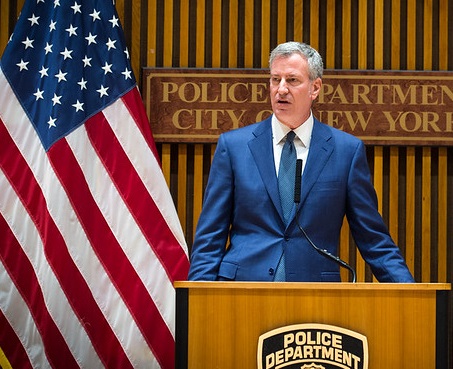
Edwin J. Torres/ Mayoral Photo Office.
Mayor de Blasio at One Police Plaza in 2017
During last month’s New York State Senate hearing on possible changes to Section 50-a of the Civil Rights Law, the section that prohibits the New York Police Department (NYPD) from releasing information about police officer discipline, police union officials, once again, argued vehemently against any changes to the law.
The union officials’ arguments, however, carried some irony because a transparent discipline system is one which, twenty years ago, the largest police union, the Patrolmen’s Benevolent Association, negotiated to include in its contract. In the late 1990’s, the union negotiated a provision that allowed the New York City Office of Administrative Trials and Hearings (OATH) to conduct disciplinary hearings that would normally be held in the NYPD’s internal trial room. As with all other municipal employee trials, unlike those conducted internally in the NYPD, OATH released to the public its final decisions in police officer proceedings.
The principle that public servants should be accountable to the people they serve is a simple one, and as a principle, is only compounded when applied to police officers, who are unique among public servants in that they are given the ability to deprive a citizen of his liberty, and in some instances, his life. The notion that the system of police officer accountability should be transparent to the people they are sworn to serve is commonsensical, but in rebuttal, union officials argue that transparency would first, expose officers to danger and second, expose them to humiliation, with the first rebuttal lacking any factual basis and the second rebuttal lacking a logical one.
And what happened, twenty years ago, after those decisions were released to the public? Absolutely nothing: the sky didn’t fall, lines of defendants didn’t start lining up outside police officers’ homes, respect for officers and the prestige of the NYPD did not reach single-digit poll numbers, as union officials currently claim would happen if Section 50-a did not exist. No, everyone quietly went about their business, and OATH continued to handle about 25 percent of the total number of discipline cases processed by the NYPD.
More importantly, OATH continued to release its decisions to the public, which included an officer’s name, findings of facts, ranges of possible punishments, and punishment recommendations for the commissioner. In fact, police union officials were on record as preferring the OATH process, it being seen as impartial in comparison to the NYPD trial room.
Thus, it is with a further sense of irony that outgoing NYPD Commissioner James O’Neill, with the support of Mayor Bill DeBlasio, recently proposed changes to Section 50-a that do nothing to address the lack of transparency as to discipline decisions, the proposal not even rising to the level of transparency existent twenty years ago.
The commissioner proposes to publicize an officer’s name, charges, and the outcome of the discipline process, after completion of the process, thus keeping the public in the dark as to what were the officer’s actions, what are the rules the officer is alleged to have violated, and what are the possible sanctions to be applied to these violations.
More importantly, the commissioner’s proposal doesn’t answer why: why a particular sanction was chosen, why similar conduct is sanctioned differently in other instances, why different conduct is punished at a similar level, and why some allegations, after being investigated, are not worthy of any discipline at all. In the eyes of an ordinary citizen, the commissioner’s proposal offers no clue as to how or why the discipline system functions as it does. Ultimately, the commissioner’s proposal leaves the discipline system context-less, maintaining an opaque void in the area in which he claims he wishes to engender the community’s trust.
We can do a lot better than this; twenty years ago, the OATH pilot project came to an end, and police discipline trials reverted to the NYPD internal process. (The project ended in 2003 only because of an appellate court ruling which noted that discipline matters, like the OATH project, are not subject to collective bargaining and could not be negotiated into officers’ contracts.) Nevertheless, the project was successful, by showing that releasing the decisions to the public provides a clear sense of officer accountability to an individual citizen, as well as supporting the principle that officers are ultimately accountable to the people they are sworn to serve. The people of New York deserve a transparent system of police officer accountability; repealing Section 50-a will be a good first step in getting there.
Christian Covington is an attorney and a MA student in Political Science at CUNY Graduate Center.







